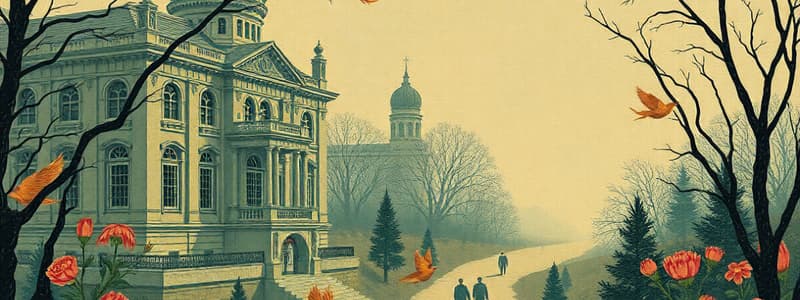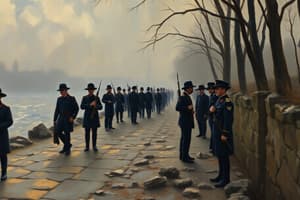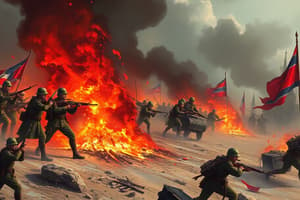Podcast
Questions and Answers
What is the term for extreme pride or devotion to one's country?
What is the term for extreme pride or devotion to one's country?
- Imperialism
- Alliance
- Militarism
- Nationalism (correct)
Which policy involves extending the rule of a nation over other countries or colonies?
Which policy involves extending the rule of a nation over other countries or colonies?
- Imperialism (correct)
- Alliance
- Militarism
- Nationalism
What does militarism refer to?
What does militarism refer to?
- Growth of large and powerful armies (correct)
- Devotion to one's country
- Efforts to standardize international postage
- Economic cooperation between nations
What is the purpose of alliances?
What is the purpose of alliances?
Which countries were part of the Triple Entente?
Which countries were part of the Triple Entente?
What was the purpose of the Universal Postal Union (1874)?
What was the purpose of the Universal Postal Union (1874)?
Which organization was created to protect civilians and prisoners of war?
Which organization was created to protect civilians and prisoners of war?
What event is considered the spark that ignited World War I?
What event is considered the spark that ignited World War I?
What resources were scarce in Russia before the 1917 Revolution?
What resources were scarce in Russia before the 1917 Revolution?
Which group eventually took control of the Russian government in 1917?
Which group eventually took control of the Russian government in 1917?
What action did soldiers take during the violent protests?
What action did soldiers take during the violent protests?
What color was associated with the communists during the Russian Civil War?
What color was associated with the communists during the Russian Civil War?
Who became the first dictator of communist Russia?
Who became the first dictator of communist Russia?
What type of ownership did the government take over under communism?
What type of ownership did the government take over under communism?
Which political party was allowed in Russia under communism?
Which political party was allowed in Russia under communism?
Who succeeded Lenin as leader of Russia?
Who succeeded Lenin as leader of Russia?
What did Stalin use to eliminate opponents?
What did Stalin use to eliminate opponents?
Following World War II, which countries became Russian 'satellites'?
Following World War II, which countries became Russian 'satellites'?
Which country did Austria-Hungary blame for the assassination of Archduke Ferdinand, leading to a declaration of war?
Which country did Austria-Hungary blame for the assassination of Archduke Ferdinand, leading to a declaration of war?
Germany viewed Russia's mobilization as an act of aggression primarily against which country?
Germany viewed Russia's mobilization as an act of aggression primarily against which country?
Which country's invasion by Germany prompted Great Britain to enter World War I?
Which country's invasion by Germany prompted Great Britain to enter World War I?
What was the primary characteristic of the 1914-1917 period of fighting on the Western Front?
What was the primary characteristic of the 1914-1917 period of fighting on the Western Front?
Which treaty ended the war between Russia and Germany during World War I?
Which treaty ended the war between Russia and Germany during World War I?
Where was the majority of fighting between the Allies and Central Powers?
Where was the majority of fighting between the Allies and Central Powers?
Which nation first developed tanks for use in World War I?
Which nation first developed tanks for use in World War I?
What was the name of the air battles that took place during WWI?
What was the name of the air battles that took place during WWI?
Which revolution in Russia led to the country's withdrawal from World War I?
Which revolution in Russia led to the country's withdrawal from World War I?
What term was commonly used to describe the physical and psychological conditions experienced by soldiers during World War I?
What term was commonly used to describe the physical and psychological conditions experienced by soldiers during World War I?
In what year did Germany break its promise and begin attacking merchant vessels without warning?
In what year did Germany break its promise and begin attacking merchant vessels without warning?
What was the name of the passenger ship sunk by a German U-boat in 1915 that carried over 100 Americans?
What was the name of the passenger ship sunk by a German U-boat in 1915 that carried over 100 Americans?
What was the proposal in the Zimmerman Note?
What was the proposal in the Zimmerman Note?
In what year was the armistice signed, bringing an end to World War I?
In what year was the armistice signed, bringing an end to World War I?
Which international organization was established by the Versailles Treaty to prevent future world conflicts?
Which international organization was established by the Versailles Treaty to prevent future world conflicts?
Flashcards
Nationalism
Nationalism
Extreme pride or devotion in one's country, often to the detriment of others.
Imperialism
Imperialism
Extending the rule of one people over other countries or colonies.
Militarism
Militarism
The growth of large and powerful armies; glorification of military power.
Alliances
Alliances
Signup and view all the flashcards
Triple Alliance
Triple Alliance
Signup and view all the flashcards
Triple Entente
Triple Entente
Signup and view all the flashcards
International Peace
International Peace
Signup and view all the flashcards
Balkan Crisis
Balkan Crisis
Signup and view all the flashcards
1917 Revolution cause
1917 Revolution cause
Signup and view all the flashcards
Czar Nicholas
Czar Nicholas
Signup and view all the flashcards
Bolsheviks
Bolsheviks
Signup and view all the flashcards
Vladimir Lenin
Vladimir Lenin
Signup and view all the flashcards
USSR
USSR
Signup and view all the flashcards
Joseph Stalin
Joseph Stalin
Signup and view all the flashcards
Communism Takeover
Communism Takeover
Signup and view all the flashcards
Communist Party
Communist Party
Signup and view all the flashcards
Lenin & Stalin
Lenin & Stalin
Signup and view all the flashcards
Eastern European Satellites
Eastern European Satellites
Signup and view all the flashcards
WWI Start
WWI Start
Signup and view all the flashcards
Belgium Invasion
Belgium Invasion
Signup and view all the flashcards
Western Front
Western Front
Signup and view all the flashcards
WWI Technology
WWI Technology
Signup and view all the flashcards
WWI Tanks
WWI Tanks
Signup and view all the flashcards
Treaty of Brest-Litovsk
Treaty of Brest-Litovsk
Signup and view all the flashcards
Bolshevik Revolution (1917)
Bolshevik Revolution (1917)
Signup and view all the flashcards
"Shell Shock"
"Shell Shock"
Signup and view all the flashcards
Broken Promises
Broken Promises
Signup and view all the flashcards
Lusitania
Lusitania
Signup and view all the flashcards
Zimmerman Note (1917)
Zimmerman Note (1917)
Signup and view all the flashcards
Battle of Verdun
Battle of Verdun
Signup and view all the flashcards
Battle of Marne
Battle of Marne
Signup and view all the flashcards
Armistice (WWI)
Armistice (WWI)
Signup and view all the flashcards
League of Nations
League of Nations
Signup and view all the flashcards
Study Notes
- World War I marked the decline of Europe's global power after nearly 400 years and brought significant historical changes globally.
Underpinnings of the War
- Nationalism: Extreme pride and devotion to one's country.
- Imperialism: Extending a nation's rule over other countries or colonies.
- Militarism: The buildup of large and powerful armies.
- Alliances: Partnerships for protection, creating a balance of power but also enabling aggression.
Pre-War Alliances
- Tension led to nations forming alliances for security.
- These alliances were initiated by Germany, Austria-Hungary, and during the Balkan Crisis, led by Otto Von Bismarck.
Triple Alliance
- The Triple Alliance involved Germany and the German Chancellor.
- Italy would later leave the alliance during World War i.
- Resulted in the creation of the Triple Entente.
Triple Entente
- The Triple Entente consisted of Great Britain, France, and Russia.
- Established a balance of power after the Triple Alliance formed
International Peace Efforts
- Nations attempted to improve economic conditions and avoid military conflict through cooperation.
- Economic interdependence was seen as a means to avert conflict.
International Peace Initiatives
- International Telegraph Union (1865) aimed to improve communication between nations.
- Universal Postal Union (1874) standardized international postage.
- Revival of Greek Orthodox efforts promoted regional solidarity.
- Pan American Union (1889) sought to increase equal treatment in foreign mail.
- International Red Cross (1863) was established to protect civilians and prisoners of war.
Balkan Crisis
- The Balkan Crisis triggered the events leading to World War I, marking a major turning point for Europe.
- The Austro-Hungarian empire contained Serbian territory, leading to tensions.
- Austria-Hungary considered annexing Serbia, which led to conflict.
Austria-Hungary's Action (1914)
- Austro-Hungarian officials blamed Serbia for the assassination of Archduke Franz Ferdinand by Serbian nationalist Gavrilo Princip.
- On July 28, 1914, Austria-Hungary declared war on Serbia.
- Germany declared war on Russia and then France, viewing Russia's mobilization as aggression.
- Great Britain entered the conflict after Germany's actions, honoring its promise to defend Belgium.
German Invasion
- Germany invaded neutral Belgium.
- From 1914-1917, there was intense fighting with "great changing hands".
- The British army was utilized after the invasion.
- Germany aimed for quick victories over France, Russia, and the Ottoman Empire and Bulgaria.
- The Treaty of Brest-Litovsk, signed March 3, 1918, ended the war between Russia and Germany.
Scope of Fighting
- Major fighting between the Allies and Central Powers occurred on the Western Front in Northeastern France, stretching 125 miles.
- Military technology and fighting tactics significantly advanced.
Military Technology
- Tanks (1916): First built by the British, with a top speed of 5 mph.
- Air battles were called "Dog Fights".
- 16" Howitzer Cannons: German Big Bertha fired shells over 75 miles.
- 75mm Cannon: Used by the French.
- Machine Guns: Widely used by the United forces.
- Other technologies included hand grenades, mines, flamethrowers, mustard gas, and poison gas.
Bolshevik Revolution (1917)
- After the treaty, Russia sent forces, and negotiated with Germany.
- Lenin and the Bolshevik Party took control of Russia in 1917, initiating a civil war.
- Lenin ceded territory to Germany.
- American soldiers experienced "Shell Shock," a severe physical and psychological condition.
The War at Sea
- German warships and submarines attacked merchant, supply, and passenger ships without warning, breaking a 1915 promise.
- The "American Lusitania," carrying over 1,200 people (128 Americans), was sunk by a German torpedo in 1915.
- The Zimmerman Note (1917): British agents intercepted a telegram revealing Germany's proposal for Mexico to attack the US.
- Germany's support towards the Mexican telegram weakened, placing additional strain on America's hope of going back, losing political support from the war against the United States in hopes to create an alliance with Mexico.
Battles of WWI
- Battles of Verdun (Sept-Dec 1916): The longest battle, spanning 25 miles.
- The First Battle of the Marne in 1914 was the first offensive of the war.
- The Battle of the Somme resulted in tremendous losses.
Battle of Marne
- Battle of Marne (Feb-Sept 1914): German forces advanced within 25 kilometers.
- Allied offensive (Summer & Fall 1916) at Verdun: 20,000 British and 5 million were killed on the first day.
- Tanks and chemical weapons were first used in the war during these battles.
- Battle of the Somme: Nearly 20,000 soldiers wounded in the battle.
Peace efforts
- Allies Tried to Build a Peace Pact.
Armistice
- 13 million civilians died due to famine, disease, and injuries
- The armistice was signed on November 11, 1918, at the 11th hour of the 11th day of the 11th month.
Versailles Treaty
- The League of Nations was established to prevent future world conflicts.
- Germany's military (army and navy) was reduced.
- Germany had no part in the treaty making process.
- Germany had to accept responsibility for the war.
- Germany was obligated to pay war reparations.
- Germany ceded land to France (Alsace-Lorraine), Belgium, Denmark, Czechoslovakia, and Poland.
- Great Britain, the Treaty of Versailles - Allied nations won three - USA - David Lloyd George - Great Britain
Changes
- Austria-Hungary, the Ottoman Empire, and the Russian Empire were now mandated to the Allied.
- Austria, Hungary, Yugoslavia, and Czechoslovakia were created from the old Austria-Hungarian Empire.
- Poland, Latvia, Lithuania, and Estonia were created from the old Russian Empire.
- Syria, Iraq, Jordan, and Palestine were created from the old Ottoman Empire.
- The countries of the Middle East are a result of World War I.
Russian Revolution
Causes
- Dissatisfaction with Romanov czars' rule.
- Czar was supported by poor peasants called serfs who lived and worked on land owned by aristocrats
- Aristocrats were given political power over the peasants.
- Serfs had to pay taxes to the czar, forced to serve in the army where they were poorly paid and were sometimes forced to stay on the land and continue working
- Nicholas II limited the role of peasants and workers in the government.
- Serfs were granted personal rights, and worker strikes became common in the late 1800's and peasant revolts.
- Revolutionary groups were organized.
- Russo-Japanese War ended in a humiliating defeat for Russia.
- Weak and disorganized rule by czars.
- Nicholas replaced experienced government officials with unqualified and inexperienced people amidst the war
- Food, fuel, and housing aids fell short.
- Russian armies were soundly defeated, and nearly 2 million people lost their lives.
Revolution of 1917
- Shortages of bread and coal prompted riots and strikes.
- Soldiers sided with demonstrators during violent protests.
- Aristocrats and educated Russians joined the revolution.
- Bolsheviks (communists) took control and signed a peace treaty with Germany, ending Russian involvement in WWI.
- Nicholas resigned from power.
- Reds defeated the anti-communist states ("Whites").
- Vladimir Lenin became the first dictator of communist Russia.
- Lenin established the "Union of Soviet Socialists Republics" (U.S.S.R.)
- The communists organized the Union Republics, or states, growing from 15 in the 1920's to 15 in 1930's and 1940's.
- Lenin died in 1924 and was succeeded by Joseph Stalin.
Results
- Government took ownership of land, factories, mines, banks, and railroads.
- The Communist Party was the only political party allowed in Russia.
- Lenin's Party was the only one that could be used and was allowed to be used in the mid-1930's Stalin used the "Great Purge" to arrest or put to death opponents.
- Secret police used force and terror to send party officials, army officers, and factory managers into labor camps.
- Lenin's "New Economic Policy (NEP) and Stalin's "Five Year Plans" greatly improved the Russian economy.
- Russia developed into one of the world's leading industrial nations.
- Bolsheviks thought the Russian Revolution of 1917 would lead to revolutions in other countries.
- Russian communists established the "Comintern".
- The Comintern disbanded after attempts to spark revolutions failed.
- Stalin governments were set up in numerous countries in Europe and Asia following World War II.
- Russia refused to withdraw from nations in Eastern Europe occupied during the Red Army's campaign against Germany.
- Eastern European countries became Russian "satellites" with communist governments loyal to the Soviet Union (Bulgaria, Czechoslovakia, etc.)
- The "Cold War" was a period of tension between the Soviet Union and the United States.
- Local communists took over the governments of Yugoslavia, Albania, and North Vietnam.
- Communist movements were established in Cuba, North Korea, Cambodia, and Mongolia.
- Communist defeated Nationalists in a civil war in China.
- An early goal of communist was the worldwide overthrow of "capitalism", etc.
- Private ownership (instead of government ownership) of factories, farms - the communist countries today tend to be more interested in their own future than in the spread of communism to other parts of the world.
- Communist and non-communist countries now lean toward "peaceful co-existence".
Studying That Suits You
Use AI to generate personalized quizzes and flashcards to suit your learning preferences.
Description
This quiz covers the causes, events, and consequences of World War I and the Russian Revolution. It explores topics such as nationalism, militarism, alliances, and the rise of communism in Russia. Test your knowledge about the key players and factors that shaped these pivotal historical moments.




